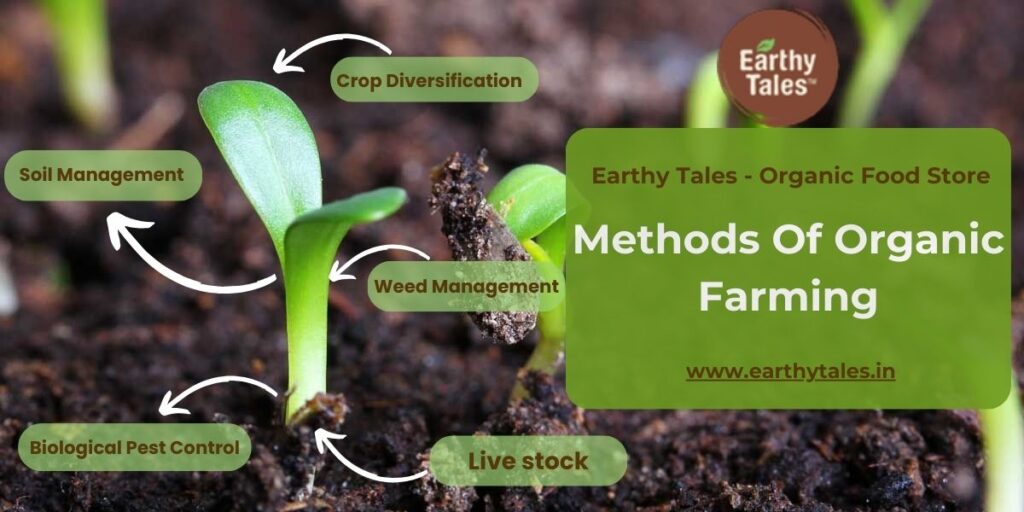
Organic farming methods prioritize sustainability and environmental health by utilizing natural processes and resources to cultivate crops. These methods avoid synthetic pesticides, herbicides, and genetically modified organisms (GMOs), relying instead on crop rotation, composting, and biological pest control to maintain soil fertility and manage pests. Cover cropping and mulching are common practices to improve soil structure and retain moisture, reducing the need for irrigation. Organic farmers also emphasize biodiversity, fostering ecosystems that support beneficial insects and wildlife. By integrating these practices, organic farming aims to produce nutritious crops while minimizing negative impacts on ecosystems and human health.

Organic farming method represents a transformative approach to agricultural practice, emphasizing sustainability, environmental stewardship, and natural methods to cultivate crops while minimizing adverse impacts on ecosystems and human health. At its essence, organic farming method diverges from conventional agriculture by rejecting synthetic pesticides, herbicides, and genetically modified organisms (GMOs), opting instead for holistic techniques that promote soil health, biodiversity, and sustainable farming practices.
Central to organic farming method is the principle of crop rotation. This practice involves systematically alternating the types of crops grown in a specific field over time. By diversifying crop species and families, organic farmers can naturally manage soil nutrients, prevent pest and disease buildup, and improve overall soil health. For instance, leguminous crops like peas and beans are often integrated into rotations because they fix nitrogen from the atmosphere into the soil, reducing the need for synthetic fertilizers while enhancing soil fertility and structure.
Organic farming method also emphasizes the use of organic compost and manure to enrich soil fertility. Composting involves the decomposition of organic matter such as crop residues, food scraps, and animal manure, which creates nutrient-rich humus. This organic matter improves soil structure, enhances water retention, and fosters a robust microbial community essential for nutrient cycling and plant health. By recycling organic materials back into the soil, organic farmers minimize reliance on external inputs and support long-term soil health.
Biological pest control plays a crucial role in organic farming method, focusing on natural predators, parasites, and plant-based repellents instead of synthetic pesticides. Beneficial insects like ladybugs, predatory mites, and parasitic wasps are introduced to combat pests, effectively regulating pest populations without harming beneficial organisms or contaminating the environment. Additionally, organic farmers utilize botanical extracts, such as neem oil or pyrethrin derived from chrysanthemum flowers, as natural alternatives to chemical pesticides, further promoting ecological balance and minimizing ecological footprint.
Cover cropping and mulching are integral practices within organic farming method that contribute to soil conservation and fertility. Cover crops, such as clover or rye, are planted during off-season periods to protect soil from erosion, suppress weeds, and improve soil structure by adding organic matter upon decomposition. Mulching involves applying organic materials like straw, leaves, or grass clippings to the soil surface, which conserves moisture, moderates soil temperature, suppresses weeds, and enhances soil health. These practices not only contribute to soil conservation but also reduce the need for irrigation and promote a healthier growing environment for crops.
Biodiversity is another cornerstone of organic farming method, promoting ecological resilience and natural pest management. By cultivating diverse crop varieties and incorporating hedgerows, windbreaks, and wildflower borders, organic farmers create habitats for beneficial insects, birds, and wildlife. These diverse ecosystems support natural pollination, pest control, and nutrient cycling, reducing dependence on external inputs and enhancing farm resilience to pests, diseases, and climate variability.
Organic certification ensures transparency and compliance with strict standards for organic farming method. Certified organic farmers must adhere to regulations that prohibit the use of synthetic chemicals and GMOs, require sustainable soil management practices, and promote biodiversity conservation. Through rigorous inspections and audits, certification bodies verify that organic farms maintain integrity and adherence to organic principles, providing consumers with confidence in the authenticity and environmental sustainability of organic products.
Consumer demand for organic products continues to rise, driven by concerns about health, environmental sustainability, and ethical food production. Organic farming method offers consumers a way to support sustainable agriculture practices that prioritize soil health, biodiversity conservation, and ecosystem integrity. By choosing organic products, consumers contribute to a food system that values environmental stewardship and promotes healthier living for both present and future generations.









